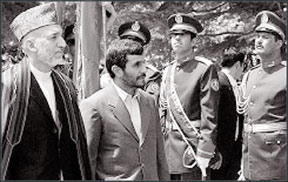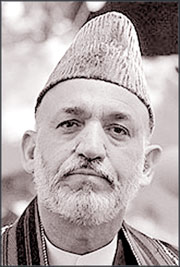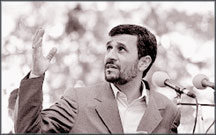Iran president says no weapons for Taliban
KABUL - Iranian President Mahmoud Ahmadinejad on Tuesday
rejected US and British claims that Iranian weapons are being supplied
to Taliban insurgents fighting the Afghan government and international
troops.
"I doubt seriously if there is any truth in it," Ahmadinejad said at
a press conference with Afghan President Hamid Karzai in Kabul on his
first visit to the country since taking office.
|

Mahmoud Ahmadinejad and Hamid Karzai (L) inspect a guard of
honor |
"With all our force, we support the political process in
Afghanistan," he said. Both British and US officials have charged that
Iranian-made weapons were aiding the Taliban, the extremist militia
waging a guerrilla war against the Kabul government as well as the
multinational forces here.
US Defence Secretary Robert Gates said in June there were so many
weapons of Iranian origin coming into Afghanistan that it was hard to
believe "it's taking place without the knowledge of the Iranian
government."
The charges have been strongly denied by Tehran, which was a staunch
opponent of the Taliban movement's 1996-2001 regime in Afghanistan.
Karzai has also downplayed the claims, saying they have not been
proven.Afghanistan was close to Iran and also a friend and strategic
partner of the United States, Karzai told reporters after meeting
Ahmadinejad.
|

Hamid Karzai |
"If Afghanistan can bring them closer, that will be a great happiness
for Afghanistan -- but it depends on both sides," Karzai said.The United
States led the invasion that drove the Taliban from power in late 2001
and is the biggest supplier of troops towards international efforts to
defeat the Taliban insurgency.
It has about 27,000 soldiers and several bases inside Afghanistan.
The Iranian president said that his country, which shares a longer than
900 kilometre (550-mile) border with Afghanistan, felt the "first
impact" of any security troubles in Karzai's nation.
"For us, a secure and stable Afghanistan is the best," Ahmadinejad
said. Karzai raised eyebrows this month when he said on the eve of talks
with President George W. Bush that Iran was "a helper and a solution" to
problems in Afghanistan, pointing to cooperation in the fight against
terrorism and drugs.
Bush responded saying he "would be very cautious about whether or not
the Iranian influence there in Afghanistan is a positive force."
|

Mahmoud Ahmadinejad |
The anti-US Iranian president meanwhile blamed certain "powers", whom
he did not identify, for the creation of terrorism which he said also
affected his country.
Some did their "utmost to impose themselves and their ideologies on
others," he said, and there were those who "want the whole world for
themselves."
After their meeting, the leaders signed a memorandum of understanding
on cooperation.
Officials from both sides also signed several accords, including on
Iranian help towards capacity building in the Afghan government and in
building a road in the west of the country.
The visit was also likely to have focused on Tehran's expulsion of
Afghans illegally residing in Iran.
Since April around 170,000 unregistered Afghans have been driven out,
sparking considerable concern over Kabul's ability to cope with the
influx.
Ahmadinejad visited the Iranian embassy before ending his trip to
Kabul. He was due to travel on to Turkmenistan and then Kyrgyzstan for
Thursday's summit of the Shanghai Cooperation Organisation.
Iran has observer-status at the Organisation, which brings together
Russia and China with other Central Asian states.
AFP |
